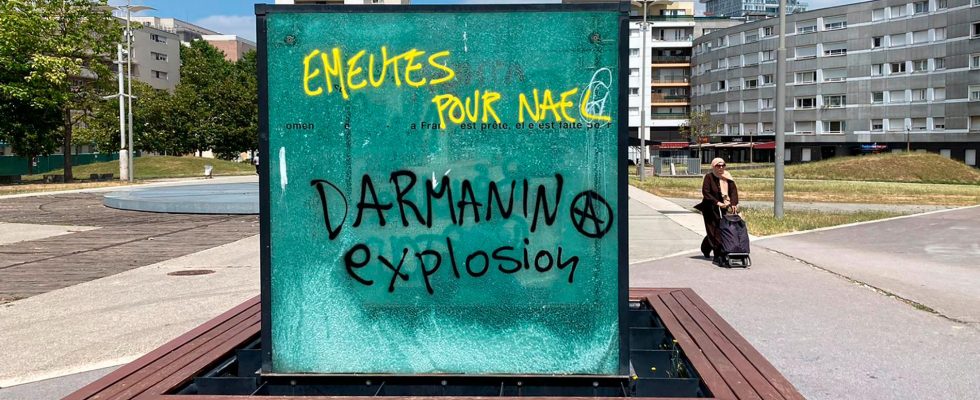1 / 4Photo: Cara Anna/AP/TT
Fireworks ban, massive police presence and a canceled presidential speech. When the French celebrate National Day today, it is in a country that has once again been rocked by violent riots.
– Where or when the spark that can light a new fire appears is impossible to know, says Wojtek Kalinowski, head of the Veblen Institute for Economic Reforms think tank in Paris.
Despite the fact that the drifts of broken glass barely had time to be swept up from the streets of many French cities after the riots that shook the country a couple of weeks ago, France’s National Day is celebrated today.
Usually, the celebration includes, among other things, large-scale fireworks and a pompous military parade on Paris’ Champs-Élysées parade street. However, this year’s festivities look to be more subdued – not least after fireworks for private use were banned by the authorities, as these were used as weapons during the riots.
The unrest in June was sparked by the shooting death of a 17-year-old boy by police at a traffic stop in the Paris suburb of Nanterre — an event that reignited a long-standing debate about police violence and discrimination against people in France’s low-income areas.
The country’s police have far-reaching powers to search people, and several sociological studies show that men of African and Arab origin are stopped significantly more often than others.
Among other things, the CNRS, France’s largest public research organization with a focus on basic research, states that these are between seven and eleven times more likely to be stopped by the police than other French people. The Council of Europe also comes to the same conclusion in a report.
The police unprepared
A major problem within the French police force is that many police officers lack adequate training in conflict management, according to Wojtek Kalinowski, head of the Veblen Institute for Economic Reforms think tank in Paris.
– They are often prepared and unprepared. The police are certainly exposed to violence and end up in difficult situations, but in other countries they are trained for just this, he says.
Kalinowski believes that within the police force there is also a strong sense of betrayal by the country’s judiciary.
– There is a constant debate, where the judiciary and the courts are accused of releasing the arrested young people too quickly. In addition, it is often pointed out that you are forced to work under extreme conditions, he says.
The violent riots in June were also far from the first where young people from the suburbs – “les banlieues” – have come into conflict with the French police force. As recently as 2005, the death of two young boys in the Paris suburb of Clichy-sous-Bois triggered three weeks of violent riots, which led, among other things, to a state of emergency being declared in the country.
According to Torun Börtz, journalist, author and France connoisseur, the very location of these suburbs, far outside the city centers, also contributes to exclusion.
– These areas were not built as natural continuations of the cities, and as communications are often very poor, they become isolated islands. When all community services eventually disappear, residents feel that society does not care about them, she says and adds:
– And when it is the people with the most resources who stay behind, the exclusion is felt to be even greater.
The spark ignites
The riots in June subsided after six days of riots, car fires and looting in many French cities – but ahead of this year’s National Day celebrations, the situation in the country remains tense.
French Interior Minister Gerald Darmanin announced on Thursday that 45,000 police officers – the same number as during the riots in June – will patrol the country’s streets “in order to avoid the repetition of these violent events”. The country’s president, Emmanuel Macron, has also announced that he has canceled a speech to the nation, which would have been broadcast on French television during National Day.
Predicting the future in the current tense situation in the country is also impossible, according to Wojtek Kalinowski.
– Where or when the spark that might light a new fire appears is impossible to know. But the fact that both sides interpret the situation differently sets the stage for future problems, he says.
FACT Riots in France
In 2005, violent riots raged for weeks in France.
The riots were sparked after two boys died in the Paris suburb of Clichy-sous-Bois. The boys had, during a police hunt, hid in a substation and then come into contact with live wires.
On June 27, 2023, two motorcycle police officers stop a car in the Paris suburb of Nanterre and the 17-year-old driver Nahel is shot at close range in the chest and dies.
The police state that the shots were fired because Nahel drove the car towards the police, but a video clip that is being circulated on social media shows that the police’s first version is not correct.
The 38-year-old police officer who is seen holding the gun in the clip is later arrested on suspicion of murder.
The fatal shooting revives the debate about police violence and discrimination against people in France’s low-income areas.
In 2022, 13 people were shot dead after refusing to stop at a checkpoint, the highest number ever in France.
France’s National Day has been celebrated on July 14 every year since 1880. It is the anniversary of the storming of the Bastille fortress, which was the starting point for the French Revolution in 1789.
Read more
